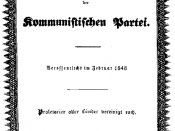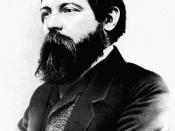Ideal Ideal
The Industrial Revolution and its shifts in economic thinking can easily be considered one of, if not the, most influential elements shaping the western world as we see it today. These shifts in thinking, rooted in the writings of many 17th and 18th century philosophers, led to shifts in legislation, political structure, and new class lines were drawn. The function of this new system, the capitalist system, has been pondered, discussed, and written about by countless authors but no literature has been so widely regarded as not just groundbreaking, but epic in its influence as the writings of Adam Smith, and the combined efforts of Karl Marx and Frederick Engels. In An Inquiry into the Nature and Causes of the Wealth of Nations Adam Smith discusses a number of the benefits of Capitalism while Marx and Engels use The Communist Manifesto to express their shared disdain for the position of workers in a post-industrialization capitalist society.
Each of these works contain opinions so popular among their followers that the opinions hypothesized with them have sparked interest, thought, debate, revolution, and even war. Adam Smith's praise of the division of labor during the industrial revolution find it's antithesis in The Communist Manifesto, but a synthesis of efficiency and equity could lead to a more just society for people today, hundreds of years after these papers were written.
The Industrial Revolution began out of necessity due to a fusion of new circumstances. The increase of oversea trade and the importing of raw materials imported from colonies like the Americas, more efficient agricultural method to produce these raw materials, and the huge increase in population between the 18th and 20th centuries changed the shape of society to one which had never been earlier imagined. This, combined with the new idea of...



Comment...
Well thought out and well written. Good Job.
3 out of 4 people found this comment useful.